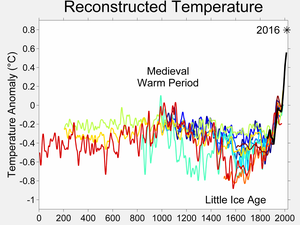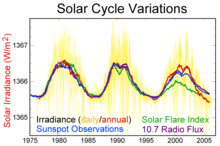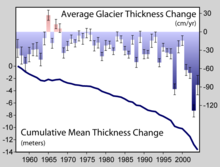Calefactio globalis

Mediae superficiei Telluris temperaturae secundum varias per duo millennia refectiones, ex procuratoribus climatis, quoque in gradu decadali levato, perscriptione temperaturae instrumentalis nigro inducto (tabula Anglice signata).

Temperatura orbis terrarum, ab Aera Palaeozoica usque ad tempora nostra (tabula Anglice signata).

Energia (calor) variis systematis climatis ob calefactionem globalem addita (tabula Anglice signata).
Calefactio globalis est auctio mediae temperaturae atmosphaerae et oceanorum Telluris post saeculum undevicensimum exiens et eius continuatio opinabilis. Post saeculum vicensimum ineunte, media superficiei Telluris temperatura circa 0.8 C crevit, cuius circa duae partes incrementi post annum 1980 factae sunt.[1] Calefactio systematis climatis est clarissima, et scientistae sunt certi plus quam 90 centesimas eam praecipue per crescentis gasorum thermocepicorum concentrationes ob actiones humanas sicut fomes fossiles incensi et desilvatio effectam esse.[2][3][4][5] Hae inventiones agnoscuntur ab omnibus academiis scientiae naturalis omnium maiorum civitatum industrializatarum.[6]
Epitoma proiectionum exemplaris climatis in Quarta Aestimationis Relatione IPSS (2007) ab Intergovernmental Panel on Climate Change datur; quo IPCC indicat per saeculum vicensimum globalem superficiei temperaturam probabiliter elevari addita 1.1 ad 2.9 C in sua minima, et a 2.4 ad 6.4 C in sua maxima aestimatione emissionum.[7] Variationes harum aestimationum ex usu exemplarium quibus sunt variae climatis sentiendi facultates erga gasia thermocepica oriuntur.[8][9]
Calefactio et mutationes coniunctae ob effectus inter regiones circa Tellurem variabuntur.[10] Inter effectus incrementi temperaturae globalis sunt elevatio aequoris maris, mutatio summae et exemplaribus praecipitationis, et probabilis desertorum subtropicorum expansio.[11] Calefactio exspectari maxima in regione Arctica, cum continuo recessu montium glaciei, pruinae perennis, et glaciei marinae consociata. Alii calefactionis effectus probabiles frequentiores eventuum caeli extremi casus comprehendunt, inter quos undae caloris, siccitates, maior pluvia, acidificatio oceanorum, et exstinctiones specierum ob permutantia temperaturae regimina. Inter effectus hominibus magni momenti sunt amplus cibus ex messibus deminutis[12] et detrimentum habitationis ob inundationes. Si media temperatura globalis 4 C super gradum praeindustrialem augetur, veri simile erit fines adaptionis humanae in multis orbis terrarum regionibus excedi, et multa systemata naturalia se accommodare plerumque nequire; quo facto, homines damnum contrahere beneficiorum quae illa systemata praebent et ex quibus vita et cultura humanae dependent.[13]
Index
1 Nexus interni
2 Notae
3 Bibliographia
4 Bibliographia addita
5 Nexus externi
Nexus interni
- Concilium climaticum Cancunense
- Desilvatio
- Effectus thermocepicus
- Effectus calefactionis globalis in oceanis
- El Niño
- Eremopoesis
- Negatio calefactionis globalis
- Eremopoiesis
- Energia renovabilis
- Laudato si'
- The Day After Tomorrow
Notae |
↑
America's Climate Choices. Vasingtoniae, D.C.: The National Academies Press. 2011. p. 15. ISBN 978-0-309-14585-5
↑ "Warming of the climate system is unequivocal, as is now evident from observations of increases in global average air and ocean temperatures, widespread melting of snow and ice and rising global average sea level." IPCC, Synthesis Report, Section 1.1: Observations of climate change, in IPCC AR4 SYR 2007.
↑ "Three different approaches are used to describe uncertainties each with a distinct form of language. . . . Where uncertainty in specific outcomes is assessed using expert judgment and statistical analysis of a body of evidence (e.g. observations or model results), then the following likelihood ranges are used to express the assessed probability of occurrence: virtually certain >99%; extremely likely >95%; very likely >90%." IPCC, Synthesis Report, Treatment of Uncertainty, in IPCC AR4 SYR 2007.
↑ IPCC, Synthesis Report, Section 2.4: Attribution of climate change, in IPCC AR4 SYR 2007.
↑
America's Climate Choices: Panel on Advancing the Science of Climate Change; National Research Council (2010). Advancing the Science of Climate Change. Vasingtoniae, D.C.: The National Academies Press. ISBN 0-309-14588-0
↑
"Joint Science Academies' Statement" (PDF)
↑ Meehl et al., "Global Climate Projections" (capitulum 10), "Mean Temperature" (sectio 10), in IPCC AR4 WG1 2007.
↑ Schneider Von Deimling, Thomas; Held, Ganopolski, Rahmstorf (2006). "Climate sensitivity estimated from ensemble simulations of glacial climate". Climate Dynamics
↑ Meehl et al., "Global Climate Projections" (capitulum 10), "Quantifying the Range of Climate Change" (sectio 10.5), in IPCC AR4 WG1 2007.
↑ Solomon et al., "Technical Summary,"
"Regional-Scale Projections" (sectio TS.5.3), in IPCC AR4 WG1 2007.
↑
Lu, Jian; Vechhi, Gabriel A.; Reichler, Thomas (2007). "Expansion of the Hadley cell under global warming" (PDF). Geophysical Research Letters 34 (6): L06805
↑ Lapsus in citando: Invalid<ref>tag;
no text was provided for refs namedBattisti
↑ Warren, Rachel (Ianuarius 2011). "The role of interactions in a world implementing change adaptation and mitigation solutions to climate". Phil. Trans. R. Soc. A 369 (1934): 217–241
Bibliographia |

Annual Global Temperature Anomalies 1950–2011, charta NOAA, Agitationem Australem El Niño / La Niña monstrat (tabula Anglice signata).

Observationes summae irradiationis solaris a 1979 ad 2006 ex satellitibus (tabula Anglice signata).

Perscriptiones sparsae monstrant montes glaciei decrevisse post saeculum undevicensimum iniens. Decennio 196, mensiones observationem librationis massae glacialis sinere coeperunt. (tabula Anglice signata).
- Ipcc ar4 syr (2007), Core Writing Team; Pachauri, R. K; et Reisinger, A., ed., Climate Change 2007: Synthesis Report, Contribution of Working Groups I, II and III to the Fourth Assessment Report of the Intergovernmental Panel on Climate Change, IPCC, ISBN 92-9169-122-4
- Ipcc ar4 wg1 (2007), S. Solomon; D. Qin.; M. Manning; Z. Chen; M. Marquis; K. B. Averyt; M. Tignor; et H. L. Miller, ed., Climate Change 2007: The Physical Science Basis, Contribution of Working Group I to the Fourth Assessment Report of the Intergovernmental Panel on Climate Change, Cambridge University Press, ISBN 978-0-521-88009-1
- Ipcc ar4 wg2 (2007), Parry, M. L.; Canziani, O. F.; Palutikof, J. P.; van der Linden, P. J.; et Hanson, C. E., ed., Climate Change 2007: Impacts, Adaptation and Vulnerability, Contribution of Working Group II to the Fourth Assessment Report of the Intergovernmental Panel on Climate Change, Cambridge University Press, ISBN 978-0-521-88010-7
- Ipcc ar4 wg3 (2007), Metz, B.; Davidson, O. R.; Bosch, P. R.; Dave, R.; et Meyer, L.A., ed., Climate Change 2007: Mitigation of Climate Change, Contribution of Working Group III to the Fourth Assessment Report of the Intergovernmental Panel on Climate Change, Cambridge University Press, ISBN 978-0-521-88011-4
Ipcc sar syr (1996), Climate Change 1995: A report of the Intergovernmental Panel on Climate Change, Second Assessment Report of the Intergovernmental Panel on Climate Change, IPCC pdf. The "Full Report", consisting of "The IPCC Second Assessment Synthesis of Scientific-Technical Information Relevant to Interpreting Article 2 of the UN Framework Convention on Climate Change" and the Summaries for Policymakers of the three Working Groups.
Ipcc sar wg3 (1996), J. P. Bruce, H. Lee, et E. F. Haites., ed., Climate Change 1995: Economic and Social Dimensions of Climate Change, Contribution of Working Group III to the Second Assessment Report of the Intergovernmental Panel on Climate Change, Cambridge University Press, ISBN 0-521-56051-9 pdf.- Ipcc tar wg1 (2001), Houghton, J. T.; Ding, Y.; Griggs, D. J.; Noguer, M.; van der Linden, P. J.; Dai, X.; Maskell, K.; et Johnson, C. A., ed., Climate Change 2001: The Scientific Basis, Contribution of Working Group I to the Third Assessment Report of the Intergovernmental Panel on Climate Change, Cambridge University Press, ISBN 0-521-80767-0
- Ipcc tar wg2 (2001), McCarthy, J. J.; Canziani, O. F.; Leary, N. A.; Dokken, D. J.; et White, K. S., ed., Climate Change 2001: Impacts, Adaptation and Vulnerability, Contribution of Working Group II to the Third Assessment Report of the Intergovernmental Panel on Climate Change, Cambridge University Press, ISBN 0-521-80768-9
- Ipcc tar wg3 (2001), Metz, B.; Davidson, O.; Swart, R.; et Pan, J., ed., Climate Change 2001: Mitigation, Contribution of Working Group III to the Third Assessment Report of the Intergovernmental Panel on Climate Change, Cambridge University Press, ISBN 0-521-80769-7
- Ipcc tar syr (2001), Watson, R. T.; et Core Writing Team, ed., Climate Change 2001: Synthesis Report, Contribution of Working Groups I, II, and III to the Third Assessment Report of the Intergovernmental Panel on Climate Change, Cambridge University Press, ISBN 0-521-80770-0
- National Research Council (2010), America's Climate Choices: Panel on Advancing the Science of Climate Change;, Vasingtoniae, D.C.: The National Academies Press, ISBN 0-309-14588-0
Bibliographia addita |
- Association of British Insurers (2005–06) (PDF). Financial Risks of Climate Change
- Ammann, Caspar; et al. (2007). "Solar influence on climate during the past millennium: Results from transient simulations with the NCAR Climate Simulation Model" (PDF). Proceedings of the National Academy of Sciences of the United States of America 104 (10): 3713–3718
- Barnett, Tim P.; Adam, J. C.; Lettenmaier, D. P.; Adam, J. C.; Lettenmaier, D. P. (17 Novembris 2005). "Potential impacts of a warming climate on water availability in snow-dominated regions" (abstract). Nature 438 (7066): 303–309
- Behrenfeld, MJ; O'malley, RT; Siegel, DA; Mcclain, CR; Sarmiento, JL; Feldman, GC; Milligan, AJ; Falkowski, PG et al; et al. (7 Decembris 2006). "Climate-driven trends in contemporary ocean productivity" (PDF). Nature 444 (7120): 752–755
- Choi, Onelack; Fisher, Ann (Maio 2005). "The Impacts of Socioeconomic Development and Climate Change on Severe Weather Catastrophe Losses: Mid-Atlantic Region (MAR) and the U.S". Climate Change 58 (1–2): 149–170
- Dyurgerov, Mark B.; Meier, Mark F. (2005) (PDF). Glaciers and the Changing Earth System: a 2004 Snapshot. Institute of Arctic and Alpine Research Occasional Paper #58
- Emanuel, K (4 Augusti 2005). "Increasing destructiveness of tropical cyclones over the past 30 years" (PDF). Nature 436 (7051): 686–688
- Hansen, James; et al. (3 Iunii 2005). "Earth's Energy Imbalance: Confirmation and Implications" (PDF). Science 308 (5727): 1431–1435
- Hinrichs, Kai-Uwe; Hmelo, Laura R.; Sylva, Sean P. (21 Februarii 2003). "Molecular Fossil Record of Elevated Methane Levels in Late Pleistocene Coastal Waters". Science 299 (5610): 1214–1217
- Hirsch, Tim (11 Ianuarii 2006). "Plants revealed as methane source". BBC
- Hoyt, Douglas V.; Schatten, Kenneth H. (1993–11). "A discussion of plausible solar irradiance variations, 1700–1992". Journal of Geophysical Research 98 (A11): 18,895–18,906
- Karnaukhov, A. V. (2001). "Role of the Biosphere in the Formation of the Earth's Climate: The Greenhouse Catastrophe" (PDF). Biophysics 46 (6)
- Kenneth, James P.; et al. (14 Februarii 2003). Methane Hydrates in Quaternary Climate Change: The Clathrate Gun Hypothesis. American Geophysical Union
- Keppler, Frank; et al. (18 Ianuarii 2006). "Global Warming – The Blame Is not with the Plants". Max Planck Society
- Lean, Judith L.; Wang, Y. M.; Sheeley, N. R. (2002–12). "The effect of increasing solar activity on the Sun's total and open magnetic flux during multiple cycles: Implications for solar forcing of climate" (abstract). Geophysical Research Letters 29 (24): 2224
- Lerner, K. Lee; Lerner, K. Lee; Wilmoth, Brenda (26 Iulii 2006). Environmental issues: essential primary sources. Thomson Gale. ISBN 1-4144-0625-8
- McKibben, Bill (2011). The Global Warming Reader. OR Books. ISBN 978-1-935928-36-2
- Mora, Camilo, et al. 2018. "Broad threat to humanity from cumulative climate hazards intensified by greenhouse gas emissions" in Nature Climate Change (November 2018)
- Muscheler, Raimund, R; Joos, F; Müller, SA; Snowball, I; et al. (28 Iulii 2005). "Climate: How unusual is today's solar activity?" (PDF). Nature 436 (7012): 1084–1087
- Oerlemans, J. (29 Aprilis 2005). "Extracting a Climate Signal from 169 Glacier Records" (PDF). Science 308 (5722): 675–677
- Purse, B. V.; Mellor, P. S.; Rogers, D. J.; Samuel, A. R.; Mertens, P. P.; Baylis, M.; et al. (Februario 2005). "Climate change and the recent emergence of bluetongue in Europe" (abstract). Nature Reviews Microbiology 3 (2): 171–181
- Revkin, Andrew C (5 Novembris 2005). "Rise in Gases Unmatched by a History in Ancient Ice". The New York Times
- Royal Society (2005). "Joint science academies' statement: Global response to climate change"
- Ruddiman, William F. (15 Decembris 2005). Earth's Climate Past and Future. New York: Princeton University Press. ISBN 0-7167-3741-8
- Ruddiman, William F. (1 Augusti 2005). Plows, Plagues, and Petroleum: How Humans Took Control of Climate. New Jersey: Princeton University Press. ISBN 0-691-12164-8
- Solanki, S. K.; Usoskin, I. G.; Kromer, B.; Schüssler, M.; Beer, J.; et al. (23 Octobris 2004). "Unusual activity of the Sun during recent decades compared to the previous 11,000 years" (PDF). Nature 431 (7012): 1084–1087
- Solanki, Sami K.; et al. (28 Iulii 2005). "Climate: How unusual is today's solar activity? (Reply)" (PDF). Nature 436 (7050): E4–E5
- Sowers, Todd (10 Februarii 2006). "Late Quaternary Atmospheric CH4 Isotope Record Suggests Marine Clathrates Are Stable". Science 311 (5762): 838–840
- Steffen, Will, et al. 2018. "Trajectories of the Earth System in the Anthropocene." PNAS. 6 Augusti 2018. Epitome
Svensmark, Henrik; et al. (8 Februarii 2007). "Experimental evidence for the role of ions in particle nucleation under atmospheric conditions". Proceedings of the Royal Society A (FirstCite Early Online Publishing) 463 (2078): 385–396 (online version requires registration)
- Walter, K. M.; Zimov, S. A.; Chanton, J. P.; Verbyla, D.; Chapin F. S., 3rd; et al. (7 Septembris 2006). "Methane bubbling from Siberian thaw lakes as a positive feedback to climate warming". Nature 443 (7107): 71–75
- Wang, Y.-M.; Lean, J. L.; Sheeley, N. R. (20 Maii 2005). "Modeling the sun's magnetic field and irradiance since 1713" (PDF). Astrophysical Journal 625 (1): 522–538
Nexus externi |
- Investigationes
Climate Change at the National Academies, dels.nas.edu
DISCOVER, discover.itsc.ush.edu
Educational Global Climate Modelling, edgcm.columbia.edu (EdGCM)
Global Science and Technology Sources on the Internet, www.istl.org
Global Warming Art, www.globalwarmingart.com
Met Office: Climate change, www.metoffice.gov.uk (National Weather Service)
NASA Goddard Institute for Space Studies, www.giss.nasa.gov (Global Change Research)
Nature Reports Climate Change, www.nature.com
NOAA State of the Climate Report, www.ncdc.noaa.gov
- Educatio
Best Effort Global Warming Trajectories, demonstrations.wolfram.com (Harvey Lam, Wolfram Demonstrations Project)
Global Warming, cgs.illinois.edu (Center for Global Studies at the University of Illinois)
Center for Climate and Energy Solutions, www.c2es.org
Climate Change Indicators in the United States, www.epa.gov (United States Environmental Protection Agency)
Collectio materialium de calefactione globali, www,hamburger-bildungsserver.de
Global Climate Change: NASA's Eyes on the Earth, climate.jpl.nasa.gov (NASA, JPL; Caltech)
Global Climate Change Indicators, www.ncdc.noaa.gov (NOAA)
Climate Change: Coral Reefs on the Edge, site.videoproject.com (Prof. Ove Hoegh-Guldberg, University of Auckland)
Global Warming, chemistry.beloit.edu
Global Warming Frequently Asked Questions, www.ncdc.noaa.gov (NOAA)
Koshland Science Museum – Global Warming Facts and Our Future, www.ipy.org (National Academy of Sciences)
Klimawiki, www.klimawiki.org
NOAA Climate Services, www.climate.gov (NOAA)
OurWorld 2.0, ourworld.unu.edu (United Nations University)
Pagina IPCC et eius Quarta relatio de calefactione globali .mw-parser-output .existinglinksgray a,.mw-parser-output .existinglinksgray a:visited{color:gray}.mw-parser-output .existinglinksgray a.new{color:#ba0000}.mw-parser-output .existinglinksgray a.new:visited{color:#a55858}
(Anglice)
Pellicula de effectibus calefactionis globalis in Insula Sancti Laurentii in Mari Beringensi, www.pbs.org (PBS)
Understanding Climate Change – Frequently Asked Questions, www.ucar.edu (UCAR)
What Is Global Warming? green.nationalgeographic.com (National Geographic)